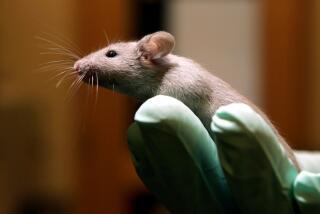Role as ‘Cancer Detective’ Seen for Patented Mouse
- Share via
WASHINGTON — The federal government Tuesday granted the first U.S. patent ever on an animal--a mouse that Harvard University scientists genetically engineered for cancer research.
By making the mouse particularly susceptible to the disease, researchers plan to use it as a kind of “cancer detective,” testing both causes and potential cures for breast cancer.
“We feel this may well be a first step toward continued genetic engineering that will permit the medical industry to fight against diseases that have been very difficult to eliminate in our lifetime,” Donald J. Quigg, commissioner of patents and trademarks, told a news conference.
The new strain of mouse was produced through a gene splicing process conducted by the Harvard Medical School researchers. A special gene was introduced into early-stage mouse embryos that caused the animals to develop tumors quickly when exposed to small amounts of carcinogenic chemicals. Offspring of the mice can inherit the gene and its characteristics and are also highly susceptible.
Supporters and critics immediately responded to the patent, escalating the long, bruising battle over the ethics of altering life forms and on genetic engineering’s economic and environmental impact.
Richard D. Godown, president of the Industrial Biotechnology Assn., hailed the patent as a “key to help unlock the mystery of disease.”
But Jeremy Rifkin of the Foundation on Economic Trends, who has filed numerous lawsuits to block genetic engineering projects, called the patent office decision an “arrogant abuse of power,” asserting that “a handful of bureaucrats at the patent office have set themselves above the Congress . . . in establishing a public policy that will have profound economic, environmental and ethical consequences for the U.S. and world community.”
Before Tuesday’s action, no U.S. patents had been issued on life forms higher than bacteria and plants. The new action quickened calls for legislation that would place a moratorium on patenting animals while the overriding genetic engineering issue is debated.
Sen. Mark O. Hatfield (R-Ore.), who has introduced a Senate bill that would place an unlimited moratorium on patents, said: “The patent office is playing fast and loose with a very serious issue, and it is time for Congress to give them their orders.”
60 Favor Legislation
An aide to Rep. Charlie Rose (D-N.C.), whose bill would put a two-year hold on patents, said that, while the congressman was disappointed at the mouse patent, he is heartened by growing awareness among his colleagues about the issue. The aide said that almost 60 House members now favor the legislation.
Defending the patent, Quigg said that “our obligation is to issue those patents” because they conform to the law.
The patent office based its decision on a 1980 Supreme Court decision that the office could not refuse to issue a patent simply because it applied to living matter.
Quigg said that 21 applications for animal patents are pending, adding that federal law requires that the subjects of the applications be kept secret. Quigg said it would be “several months” before the next patent would be issued. The application for the mouse patent, which will be in force for 17 years, had been pending since 1984.
Not for Human Being
When asked where his office would draw the line on such patents, Quigg said: “We will not grant a patent to cover a human being.”
Lillian Blacker, director of the news office at the Harvard Medical School, said the new mouse is being made available to researchers outside Harvard for $1 per specimen, “less than what it costs to produce them.”
She added: “The expectation is that this mouse will provide a useful animal model for the test of carcinogens and the equally useful model for testing anti-cancer drugs.”
Godown of the biotechnology association said that because of the animal’s heightened susceptibility to the disease, “researchers won’t have to use the massive doses typical of animal studies now. The bottom line is lower doses and fewer animals. This is a big step toward the goal of limited and humane use of animals.”
More to Read
Sign up for Essential California
The most important California stories and recommendations in your inbox every morning.
You may occasionally receive promotional content from the Los Angeles Times.








